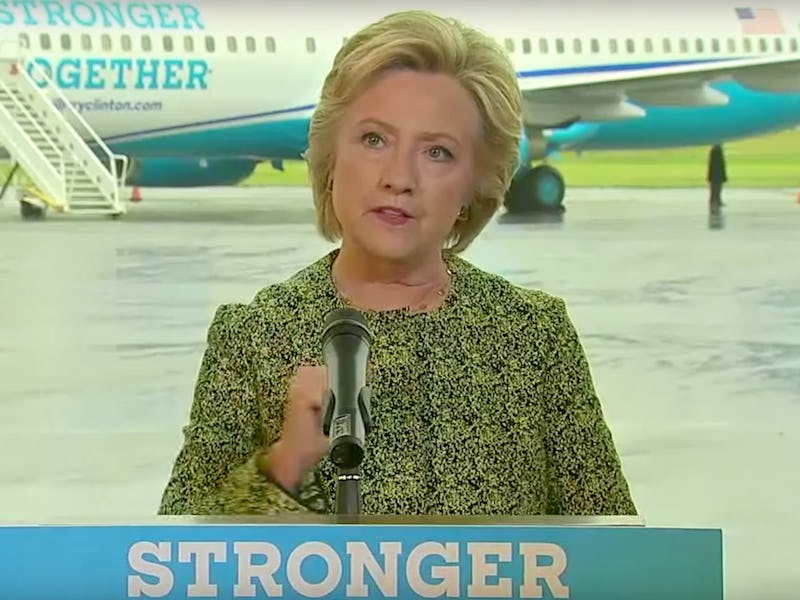Hillary Clinton: To Counter Terrorism, Enlist Silicon Valley
After the Apple vs. FBI showdown, some see this statement as disconcerting.

On Monday morning, Democratic presidential candidate Hillary Clinton said the U.S. government needs the “close participation” of America’s largest technology companies to combat terrorism.
“We need to work more closely with Silicon Valley, and other partners, to counter terrorist propaganda and recruitment efforts online,” Clinton said, speaking from the tarmac of an airport in White Plains, New York, about the New York City “pressure cooker” bombing this weekend. Clinton referenced a “comprehensive strategy” to defeat terrorism, which includes more cooperation between technology companies and intelligence agencies.
Clinton also expressed her belief that we should “launch an intelligence surge to help identify and thwart attacks before they can be carried out.” She urged people to remain vigilant and courageous, and — perhaps by design — appeared quite presidential as she did so. “Americans will not cower; we will prevail,” she said. “We will defend our country, and we will defeat the evil, twisted ideology of the terrorists.” Clinton claimed that Trump’s rhetoric, since it antagonizes an entire religion, inspires terrorism. “We know that Donald Trump’s comments have been used online for recruitment of terrorists,” she said. Citing former CIA director Michael Hayden, she agreed that “Donald Trump is being used as a recruiting sergeant for the terrorists.” She mentioned her own “comprehensive plan to meet the evolving nature of this threat, and take the fight to ISIS everywhere they threaten us — including online.”
She went into detail:
The lone wolf problem is one that we have to invest more time, and more resources, into combatting. [National security experts] made a very strong point: That the recruitment and radicalization that goes on online has to be much more vigorously intercepted and prevented. I have been saying this for quite some time, and I believe it’s an important part of our strategy. The other point they made is that the recruiters for ISIS, and these other terrorist groups, look for people who, online, demonstrate the mental profile — the level of paranoia, the level of delusion, the level of disappointment — that then is exploited by quite able terrorist recruiters.
So, we’ve got to do a much more intensive effort — and that’s why I mentioned Silicon Valley in my remarks — not only to take down terrorist propaganda, but to do everything we can to intercept and prevent radicalization and recruitment. And I think we are at the beginning of that, but there’s much more we need to do, and the government cannot do this without the close participation of tech companies, and experts online, who can give us the tools and lead us to those who are attempting to promote attacks like we have seen.
After the FBI-Apple privacy battle earlier this year, Clinton’s remarks are weighty. While some Silicon Valley companies are willing to cooperate, and most are willing to help under certain conditions, some vehemently oppose governmental overstepping. Cooperation, to the government, might mean violating the customer’s right to privacy: As it stands, the government requests a suspect’s personal data, and the company — be it Facebook, Apple, Google, Snapchat — decides whether or not to cooperate. (Facebook publishes annually its report of government requests.) The government does not like such relegation, and so, most notably in the Apple-FBI showdown, fights to recoup power and oversight.
In February, Apple elected not to assist the FBI in unlocking the San Bernardino terrorist’s iPhone. Apple CEO Tim Cook used the opportunity to bolster public trust in his company, though, as a terrorism case, it was a gamble. The media and the public seemed to side with Apple, and, over the next couple months, the debate subsided. Monday, after the New York City bombing, though, iPhones issued a first-of-its-kind “emergency alert”:
Rahami has since been taken into custody, but Clinton is reintroducing the pressure on tech companies to assist the government — and by requesting that they “give [government] the tools,” she is referencing the Apple-FBI case. The government wants a private backdoor into iPhones and other technologies, but tech companies believe that it would make devices too vulnerable to malicious actors.
Clinton is reinvigorating the debate. Republican nominee Donald Trump ought to be concerned, as he would be forced to speak about “the cyber,” which, according to him, is “so big.” Trump went on Fox & Friends Monday morning to discuss his own strategy. “This is only going to get worse, and what I said is you have to stop ‘em from coming into the country.” Later, he expanded: “We’re going to have to do something extremely tough over there. Like knock the hell out of ‘em.”